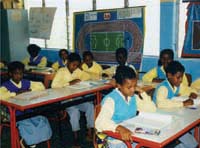
The physiological factors include how people feel, their physical health, and their levels of fatigue at the time of learning, the quality of the food and drink they have consumed, their age, etc.
Think of some physiological factors that are important when you try to study or learn something new for yourself.
Although everyone has a different pattern, most people need to feel safe and secure and not be hungry or tired. Many people are aware of the time of day they learn best — some at night, others early in the morning. It is a blend for each individual.
Physical health is important because ill health hampers learning, and so can fatigue. Studying for a long time can cause fatigue, which affects your audience's learning capacity. The time of learning also influences how much new knowledge is acquired. The quantity and quality of healthy food and drink also plays a crucial part because nutrition is responsible for efficient mental activity. Poor nutrition adversely affects learning. Alcoholic drinks and caffeine, as well as tobacco, all have an adverse effect on the capacity of people to learn. Good physiological factors promote effective learning.
People find it very difficult try to learn new things if they are in a difficult environment. Atmospheric conditions such as high temperature and humidity tend to lower mental efficiency. Studying in conditions of poor ventilation, the lack of proper lighting, where there is noise and physical discomfort, all hamper learning capacity. Good conditions make it easier to learn (Figure 6.6).

Imagine that you are teaching a family about the importance of environmental sanitation. What would you say about the following statements in regard to their effect on the effectiveness of your teaching? Which of the physiological factors are responsible for their effect on the learning process for each of the following?
Poor learning could result from the following conditions: